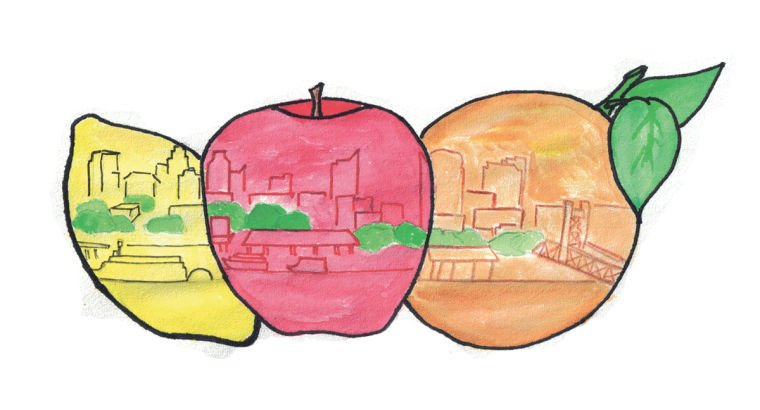Urban harvesting benefits Sacramento
November 13, 2013
The city of Sacramento is known as the City of Trees and with many of the trees growing in abundance of edible fruits and plants, it creates a resource for people to obtain free produce.
With more than 23,000 trees filled with free, edible plants and fruits in the Sacramento region, organizations like Harvest Sacramento utilize the trees to collect excess fruits and delivers the fruit to the Sacramento Food Bank.
Soil Born Farms coordinator Dominic Allamano trains volunteers for the harvesting efforts as part of the expanded team. He said incorporating areas filled with fruit trees, expands the amount of produce that can be collected.
“We start with the fruit trees, which are already there and already matured, and we send them back to the people that have planted them a generation or two ago,” Allamano said. “What we’re doing is saying, ‘Hey we have a huge and really unique resource here.”’
Soil Born Farms’ first harvest in 2009 collected about 1,000 pounds from homes in East Sacramento. This year, the organization harvested 55,000 tons of fruits from 200 to 300 home sites.
Anne Fenkner, the Greenprint Regional Coordinator of the Sacramento Tree Foundation, said the trees help the importance of community livelihood and the environment.
“Trees provide many benefits and of course producing fresh food is one of the benefits of fruit trees,” Fenkner said. “Sacramento has a long history of cultivating, packing and preparing fruit for long-term storage.”
Fenkner said the foundation is a great resource for people to properly distribute their food.
“We help guide people to select the right trees for the right places for the right reasons and food production is definitely part of that conversation,” Fenkner said. “We do offer free shade trees within the community, and last year we disseminated about 50 fruit trees to low income individuals throughout the Sacramento area.”
Contractor and the Food Access Coordinator for Soil Born Farms Randy Stannard, said he focuses his efforts on developing the concept of turning Sacramento into an edible city a reality.
“We want to go beyond what we have been doing with the fruit blooming or fruit gathering to also include edible landscape, gardening in school gardens and other components in the addition to the fruit blooming,” Stannard said.
The need for community health and support is a huge factor in the development of future projects and the initiative, Allamano said.
“That’s what we’re really looking at for both our short-term goal for those food needs and the long-term potential in rebuilding the social relationships in neighborhoods, making use of the resources around them,” Allamano said. “There is a big area of opportunity to deepen those relationships.”
Charleen McDaniel, a committed volunteer for Soil Born Farms, said she joined the urban harvesting effort because she wanted to satisfy a personal need to work for her community and found the work inspirational.
“I came across them when they were harvesting for Harvest Sacramento under the umbrella of Soil Born and there was a harvest in my neighborhood, Tahoe Park. It was very inspirational,” McDaniel said. “That day there was almost 80 volunteers and we harvested almost 300,000 pounds of fruit in a couple of hours. Giving that to the community was awesome and I definitely wanted to continue with them.”
McDaniel said she is a part of the urban harvesting in her community and hopes everyone the region will do the same.
“Now I run my neighborhood harvest in Tahoe Park and we are encouraging Soil Born and Harvest Sacramento to do that sort of thing,” McDaniel said. “I knew it was something that I wanted to do.”
Stannard said volunteers from all ages come from the Sacramento area and enjoy their time helping out because it is a different way of giving back to the community.
“The volunteer work where you can see what you have done, is a real social experience and people have fun doing it,” Stannard said. “The people who receive the fruit are really happy to receive the pretty amazing product that usually they don’t have this much access to.”
Fenkner said people are excited about the fruit they are growing and it is a part of the Sacramento culture.
“People find fruit trees exciting and they love to talk about what they are growing,” Fenkner said. “In this region, it is fairly easy to grow your own food. More importantly, fruit is very important to our well-being and also part of this region’s heritage and economy.”
Allamano said the growth of these community projects that involve collecting sustainable resources have seen a major spike in interest from people in California and all over the U.S.
“There is a real opportunity to reexamine our place and transform in how we relate to the people around us on a very basic foundational level,” Allamano said. “There is a lot of interest all over communities making that a possibility and getting wonderful results from it.”
Shannan Osrin can be reached at [email protected]





























































































































